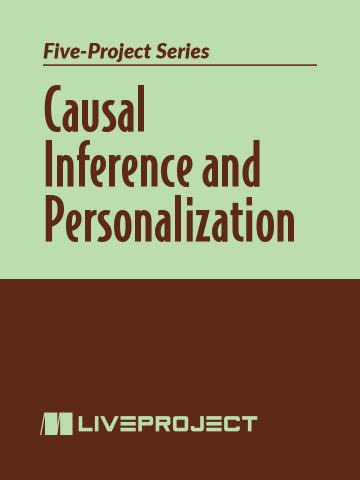- prerequisites
- basics of Python • basics of data science and machine learning
- skills learned
- use linear regression to adjust for bias and improve data • frame a personalization problem in terms of causal inference • use causal inference techniques to estimate the impact of discount on profits
pro $24.99 per month
- access to all Manning books, MEAPs, liveVideos, liveProjects, and audiobooks!
- choose one free eBook per month to keep
- exclusive 50% discount on all purchases
- renews monthly, pause or cancel renewal anytime
lite $19.99 per month
- access to all Manning books, including MEAPs!
team
5, 10 or 20 seats+ for your team - learn more

In this series of liveProjects, you’ll explore a variety of causal inference techniques to help optimize the discounting strategy of an e-commerce business. Causal inference is a groundbreaking field of data science that’s breaking out of academic offices and into practical application across industries. It provides a mathematical basis for determining how one variable (the “treatment”) will impact another, allowing predictions of how certain actions might affect business outcomes and KPIs.
This is a really strong liveProject on a subject that I think more data scientists should learn more about. I'm very happy this exists! Overall, the liveProject acts as a great hands-on companion to go along with the author's book.
here's what's included

In this liveProject, you’ll utilize causal inference techniques to help an e-commerce company estimate the impact of discounts on profits. You’ll learn how bias gets in our way of inferring the effect of discounts, and how to adjust for it for more accurate results. Leverage adjustment techniques, like linear regression, to adjust for bias and see how linear regression can improve the quality of your data. Your final task is to present a recommendation on whether the company should distribute its discounts or not.

In this liveProject, you’ll use regression discontinuity design (RDD) as a form of natural experiment that works as an alternative to A/B testing. RDD measures treatment effects at points of discontinuity to get an idea of the effectiveness of a program without needing to rigorously A/B test it. You’ll use this technique to assess the discounting strategy of an e-commerce company, in a way that will allow you to start applying causal inference to other practical problems.

In this liveProject, you’ll use difference-in-differences as an alternative to A/B testing to assess the discounting strategy of an e-commerce company. This approach compares growth between a group that has been experimented on, and data from a control group. You’ll use Python and causal inference to examine the growth trajectory in profits from customers in a high discounts group against customers that didn’t get a discount.

In this liveProject, you’ll use causal inference to investigate data on randomized discounts and determine if an e-commerce company should offer personalized discounting. You’ll estimate a different treatment effect for each customer in the hopes to see if some are positive, and figure out which customers should get what discounts. You’ll utilize Python and machine learning to build this personalization system, and implement a causal model for personalization.

In this liveProject, you’ll utilize machine learning for treatment effect estimation in order to help an e-commerce company deliver targeted discounting to the most profitable customers. You’ll build a model that predicts the effect of a discount on a customer following a causal model, maximizing profits for the business.

team
- five seats for your team
- access to all Manning books, MEAPs, liveVideos, liveProjects, and audiobooks!
- choose another free product every time you renew
- choose twelve free products per year
- exclusive 50% discount on all purchases
- renews monthly, pause or cancel renewal anytime
- renews annually, pause or cancel renewal anytime
-
![]() Causal Inference and Personalization project for free
Causal Inference and Personalization project for free
The liveProject has a good mix of hands-on exercises with solid conceptual prerequisites from the author's own book. The liveProject benefits from having an intuitive dataset/business problem to apply the causal inference techniques to. The author also takes the effort to set up the problem statement well.
Prerequisites
This liveProject series is for data scientists with knowledge of Python, machine learning, and statistics. A basic understanding of causal inference will also be helpful, but is not required. To begin these liveProjects you will need to be familiar with the following:
TOOLS
- Basics of Python
- Basics of pandas
- Basics of Matplotlib
- Basics of NumPy
- Basics of scikit-learn
- Basics of data science and machine learning
 features
features
- Self-paced
- You choose the schedule and decide how much time to invest as you build your project.
- Project roadmap
- Each project is divided into several achievable steps.
- Get Help
- While within the liveProject platform, get help from fellow participants and even more help with paid sessions with our expert mentors.
- Compare with others
- For each step, compare your deliverable to the solutions by the author and other participants.
- book resources
- Get full access to select books for 90 days. Permanent access to excerpts from Manning products are also included, as well as references to other resources.

 Causal Inference and Personalization project for free
Causal Inference and Personalization project for free